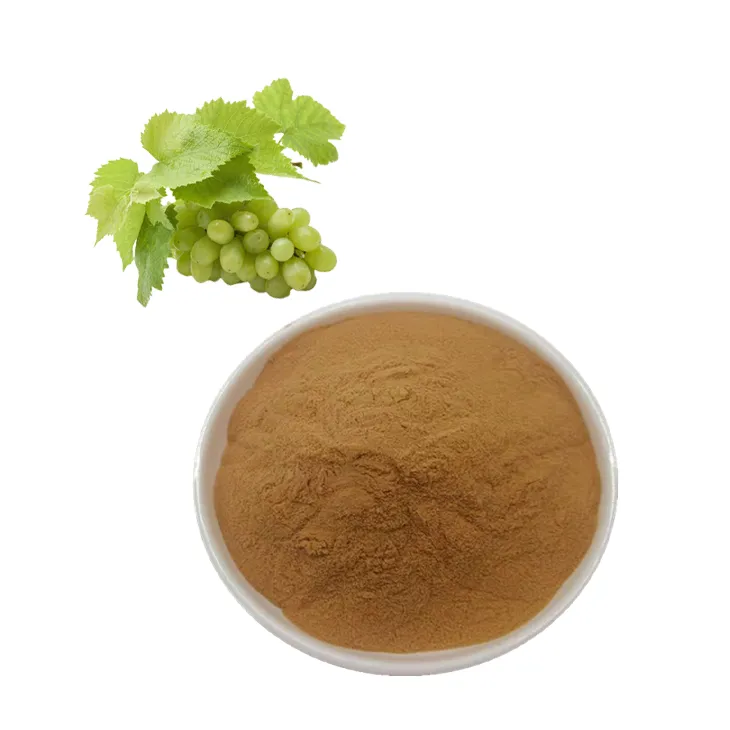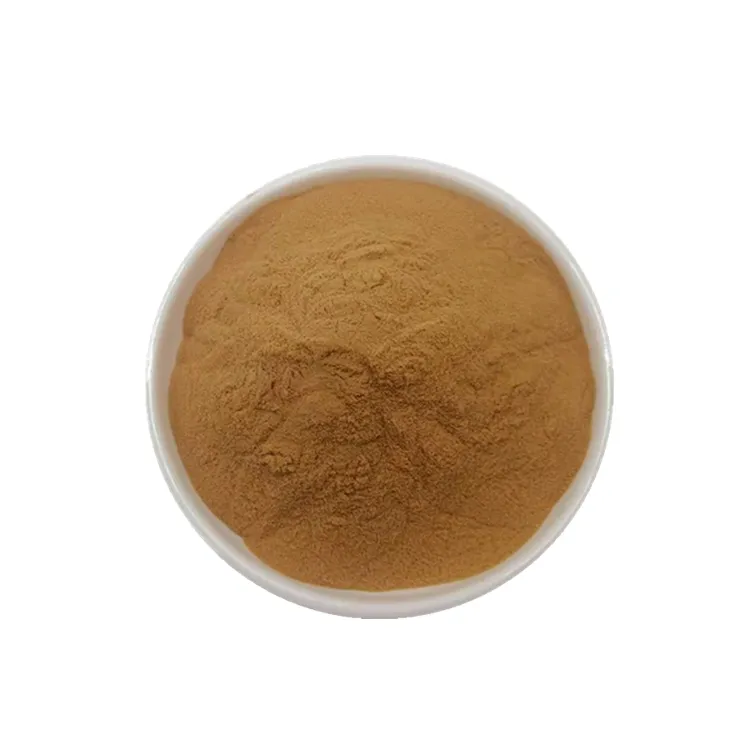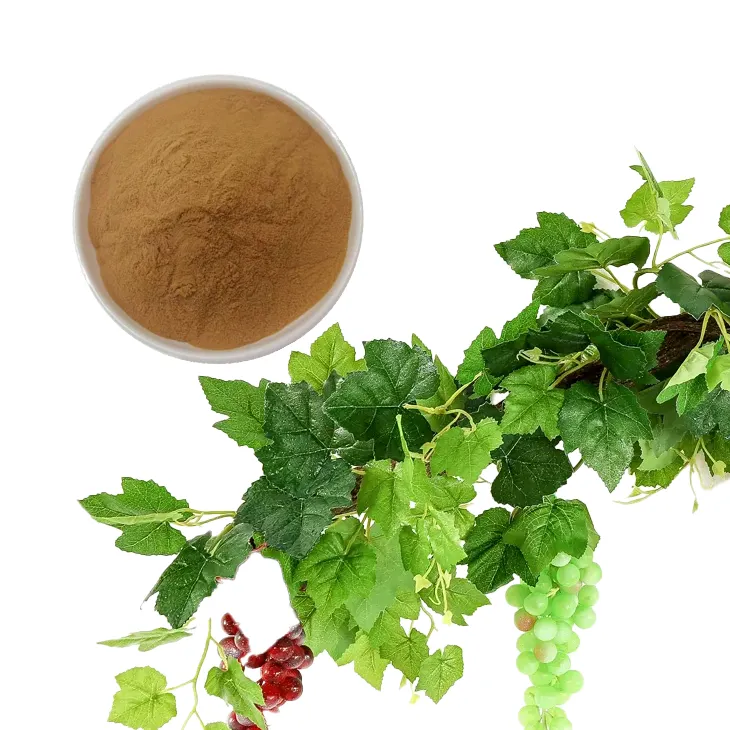- 0086-571-85302990
- sales@greenskybio.com
Grape Leaf Extract: Nature's Best - Kept Secret.
2024-11-13

Introduction
Grape Leaf Extract has long been an overlooked component of the grapevine, yet it holds a plethora of benefits that are only now beginning to be fully understood. This natural substance is emerging as a potential powerhouse in various fields, from skincare to digestive health. In this article, we will delve deep into the world of Grape Leaf Extract, uncovering its secrets and exploring why it is gaining significant attention in scientific and health - conscious communities.

The Origins of Grape Leaf Extract
Grape leaves, from which the extract is derived, are an integral part of the grapevine (Vitis vinifera). These leaves play a crucial role in the growth and development of the grapevine. They are responsible for photosynthesis, the process by which plants convert sunlight into energy. The grapevine's leaves are also involved in transpiration, which helps regulate the plant's temperature and nutrient uptake.
The quality of the grape leaf extract is highly influenced by the variety of the grapevine. Different grapevine varieties, such as Cabernet Sauvignon, Pinot Noir, and Chardonnay, have leaves with distinct chemical compositions. For example, some varieties may have higher levels of certain antioxidants in their leaves, which can result in a more potent extract.
Another factor affecting the origin of grape leaf extract is the geographical location where the grapevines are grown. The soil composition, climate, and altitude of a region can all impact the characteristics of the grape leaves. For instance, grapevines grown in regions with a Mediterranean climate may produce leaves with different nutrient profiles compared to those grown in cooler climates.

Extraction Methods and Their Impact on Quality
Solvent Extraction
One of the most common methods for extracting grape leaf extract is solvent extraction. This method involves using a solvent, such as ethanol or methanol, to dissolve the active compounds from the grape leaves. The choice of solvent can significantly affect the quality of the extract. Ethanol is often preferred as it is considered a relatively safe and effective solvent for extracting bioactive compounds from plant materials.
During solvent extraction, the grape leaves are typically ground into a fine powder to increase the surface area available for extraction. The powdered leaves are then mixed with the solvent and agitated for a period of time to ensure maximum extraction of the desired compounds. After extraction, the solvent is removed, usually through evaporation, leaving behind the concentrated grape leaf extract.
However, solvent extraction also has its drawbacks. The use of solvents may introduce impurities into the extract, and some solvents may also extract unwanted compounds along with the desired ones. Additionally, the extraction process needs to be carefully controlled to avoid over - extraction or degradation of the active compounds.
Supercritical Fluid Extraction
Supercritical fluid extraction is another method that is gaining popularity for grape leaf extract production. This method uses a supercritical fluid, most commonly carbon dioxide (CO₂), as the extracting agent. Supercritical CO₂ has unique properties that make it an ideal solvent for extracting natural products. It has a low toxicity, is easily removable from the extract, and can be adjusted to have different solvating powers by changing the pressure and temperature.
In supercritical fluid extraction, the grape leaves are placed in a high - pressure vessel along with the supercritical CO₂. The CO₂ penetrates the plant material and selectively extracts the bioactive compounds. Once the extraction is complete, the pressure is released, and the CO₂ reverts to a gaseous state, leaving behind a pure and high - quality grape leaf extract.
Although supercritical fluid extraction offers several advantages over solvent extraction, it also has some limitations. The equipment required for this method is more expensive and complex, which can increase the production cost of the extract. Moreover, the process parameters need to be precisely optimized to achieve the best extraction results.

Applications in Skincare
Anti - Aging Properties
Grape leaf extract has shown remarkable potential in the field of skincare, particularly in anti - aging. The extract is rich in antioxidants, such as polyphenols and flavonoids, which help combat oxidative stress in the skin. Oxidative stress is one of the main causes of skin aging, as it leads to the breakdown of collagen and elastin, the two proteins responsible for maintaining the skin's elasticity and firmness.
By neutralizing free radicals, the antioxidants in grape leaf extract can prevent or slow down the signs of aging, such as wrinkles, fine lines, and sagging skin. In addition, some studies have suggested that grape leaf extract may also stimulate the production of collagen in the skin, further enhancing its anti - aging effects.
Another way in which grape leaf extract can contribute to anti - aging is through its anti - inflammatory properties. Inflammation in the skin can accelerate the aging process, and the anti - inflammatory compounds in the extract can help soothe irritated skin and reduce redness.
Skin Health
Aside from its anti - aging benefits, grape leaf extract also promotes overall skin health. It has moisturizing properties that can help keep the skin hydrated, preventing dryness and flakiness. This is due to the presence of certain compounds in the extract that can form a protective barrier on the skin's surface, locking in moisture.
The extract also has antibacterial and antifungal properties, which can help protect the skin from infections. This is especially beneficial for individuals with acne - prone or sensitive skin, as it can prevent the growth of bacteria and fungi that can cause skin problems.
Furthermore, grape leaf extract may have a role in improving skin tone and texture. It can help even out skin pigmentation and make the skin look smoother and more radiant.
Significance in Promoting Digestive Health
Grape leaf extract has also been found to have a positive impact on digestive health. One of the key benefits is its ability to support healthy digestion by improving gut motility. The extract can stimulate the muscles in the digestive tract, helping to move food through the system more efficiently. This can prevent constipation and other digestive disorders.
In addition, grape leaf extract has anti - inflammatory properties in the digestive system. Inflammation in the gut can be caused by various factors, such as a poor diet, stress, or certain medications. The anti - inflammatory compounds in the extract can help reduce gut inflammation, which is beneficial for individuals with conditions like irritable bowel syndrome (IBS) or inflammatory bowel disease (IBD).
Moreover, the extract may also play a role in protecting the digestive tract from oxidative damage. The antioxidants in grape leaf extract can scavenge free radicals in the gut, preventing damage to the cells lining the digestive tract. This can help maintain the integrity of the digestive system and improve overall digestive function.
Why Grape Leaf Extract is Gaining Attention in Scientific and Health - Conscious Communities
There are several reasons why grape leaf extract is attracting increasing attention in scientific and health - conscious communities. Firstly, the growing interest in natural products and alternative medicine has led to a search for new and effective natural remedies. Grape leaf extract, with its wide range of potential health benefits, fits well into this trend.
Secondly, scientific research has been steadily uncovering the various properties and mechanisms of action of grape leaf extract. As more studies are published, the scientific community is becoming more aware of its potential applications in different fields, from skincare to digestive health.
Finally, the increasing consumer demand for products that are both effective and safe has also contributed to the popularity of grape leaf extract. Consumers are more likely to choose natural products like grape leaf extract over synthetic alternatives, especially when they are aware of the potential benefits and the relatively low risk associated with these natural substances.
Conclusion
In conclusion, grape leaf extract is a natural substance with a wealth of hidden treasures. Its origins in the grapevine, extraction methods, and applications in skincare and digestive health all contribute to its growing importance. As research continues to unfold, it is likely that we will discover even more benefits of this remarkable extract. Whether it is for anti - aging, skin health, or digestive well - being, grape leaf extract has the potential to become a staple in the world of natural health products.
FAQ:
What are the main extraction methods of grape leaf extract?
There are several common extraction methods for grape leaf extract. One is solvent extraction, which involves using solvents like ethanol or methanol to dissolve the active compounds from the grape leaves. Another method could be supercritical fluid extraction, which uses supercritical carbon dioxide. The choice of extraction method can significantly impact the quality of the extract. For example, different solvents may extract different types of compounds, and improper extraction may lead to the degradation or loss of some valuable components.
How does grape leaf extract contribute to anti - aging in skincare?
Grape leaf extract contains various bioactive compounds such as polyphenols. These polyphenols have antioxidant properties. In skincare, antioxidants can neutralize free radicals, which are unstable molecules that can damage skin cells and lead to premature aging. By reducing the damage caused by free radicals, grape leaf extract helps to maintain the skin's elasticity, reduce the appearance of wrinkles, and improve overall skin texture.
What role does grape leaf extract play in promoting digestive health?
Grape leaf extract may play a beneficial role in digestive health. It may contain compounds that can help regulate the gut microbiota. A balanced gut microbiota is essential for proper digestion, nutrient absorption, and overall gut function. Additionally, some components in the extract might have anti - inflammatory properties in the digestive tract, which can help soothe irritation and support the normal function of the digestive system.
Why is grape leaf extract considered a 'guarded secret'?
Grape leaf extract has been considered a 'guarded secret' because it has been relatively under - explored compared to other grape - derived products like Grape Seed Extract or grape juice. For a long time, its potential health benefits and applications were not widely known. However, as research progresses, more and more of its valuable properties are being discovered, and it is gradually gaining more attention in the scientific and health - conscious communities.
How can one ensure the quality of grape leaf extract products?
To ensure the quality of grape leaf extract products, several factors should be considered. Firstly, the source of the grape leaves is crucial. High - quality leaves from healthy grapevines are more likely to yield a good - quality extract. Secondly, the extraction method should be reliable and standardized. Reputable manufacturers usually follow strict extraction protocols to ensure the consistency and purity of the extract. Thirdly, look for products that have been tested for quality and purity, such as those with third - party certifications.
Related literature
- The Bioactive Compounds in Grape Leaf Extract and Their Health Benefits"
- "Grape Leaf Extract: A New Frontier in Skincare"
- "The Role of Grape Leaf Extract in Digestive Wellness"
- ▶ Hesperidin
- ▶ Citrus Bioflavonoids
- ▶ Plant Extract
- ▶ lycopene
- ▶ Diosmin
- ▶ Grape seed extract
- ▶ Sea buckthorn Juice Powder
- ▶ Fruit Juice Powder
- ▶ Hops Extract
- ▶ Artichoke Extract
- ▶ Mushroom extract
- ▶ Astaxanthin
- ▶ Green Tea Extract
- ▶ Curcumin
- ▶ Horse Chestnut Extract
- ▶ Other Product
- ▶ Boswellia Serrata Extract
- ▶ Resveratrol
- ▶ Marigold Extract
- ▶ Grape Leaf Extract
- ▶ New Product
- ▶ Aminolevulinic acid
- ▶ Cranberry Extract
- ▶ Red Yeast Rice
- ▶ Red Wine Extract
-
Giant Knotweed Extract
2024-11-13
-
Tongkat Ali Extract
2024-11-13
-
Avocado Extract Powder
2024-11-13
-
Hawthorn powder
2024-11-13
-
American Ginseng Root Extract
2024-11-13
-
Medicinal Marshmallow Extract
2024-11-13
-
Tongkat Ali Extract Powder
2024-11-13
-
Moringa powder
2024-11-13
-
Green coffee bean Extract
2024-11-13
-
Bamboo Leaf extract
2024-11-13





















